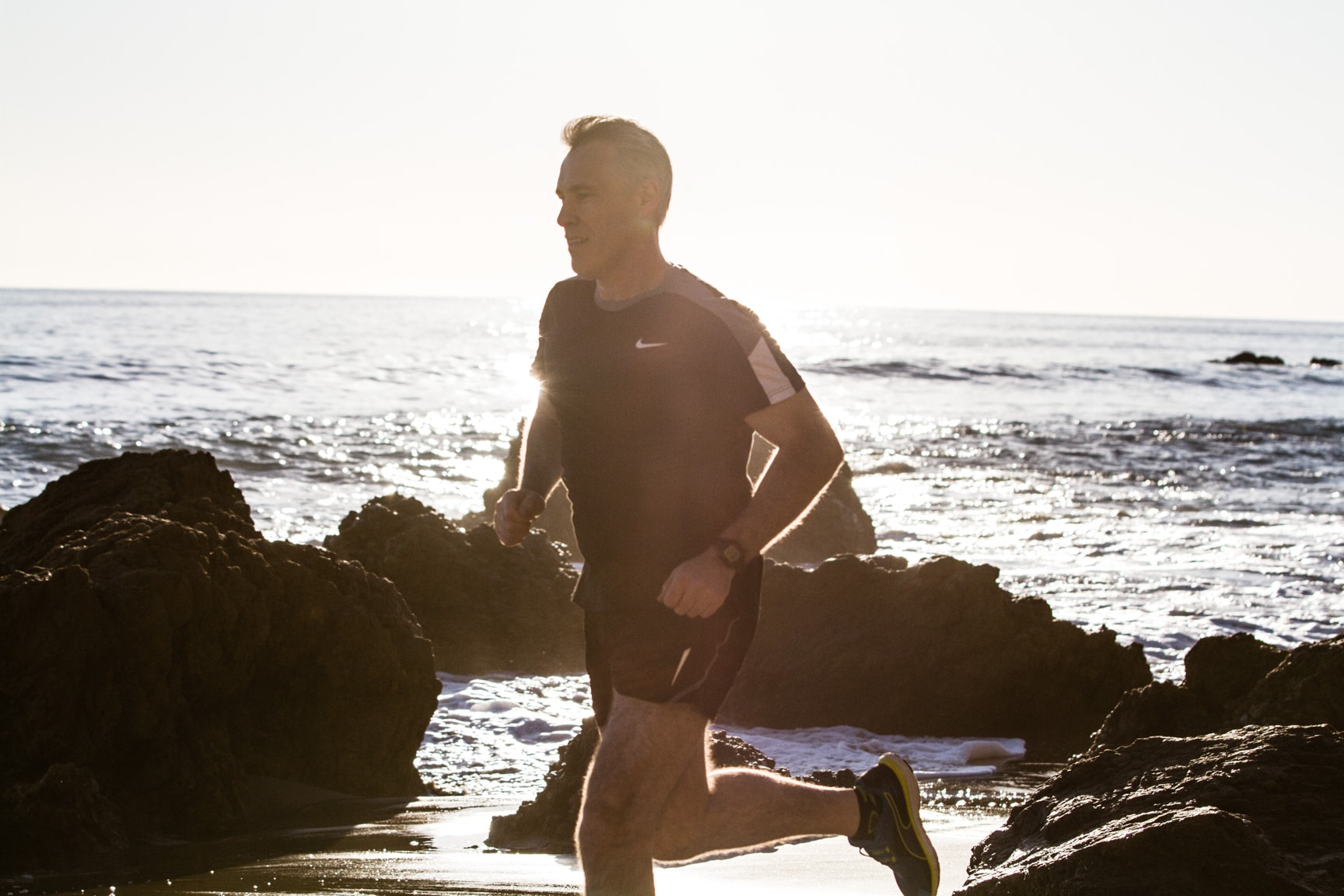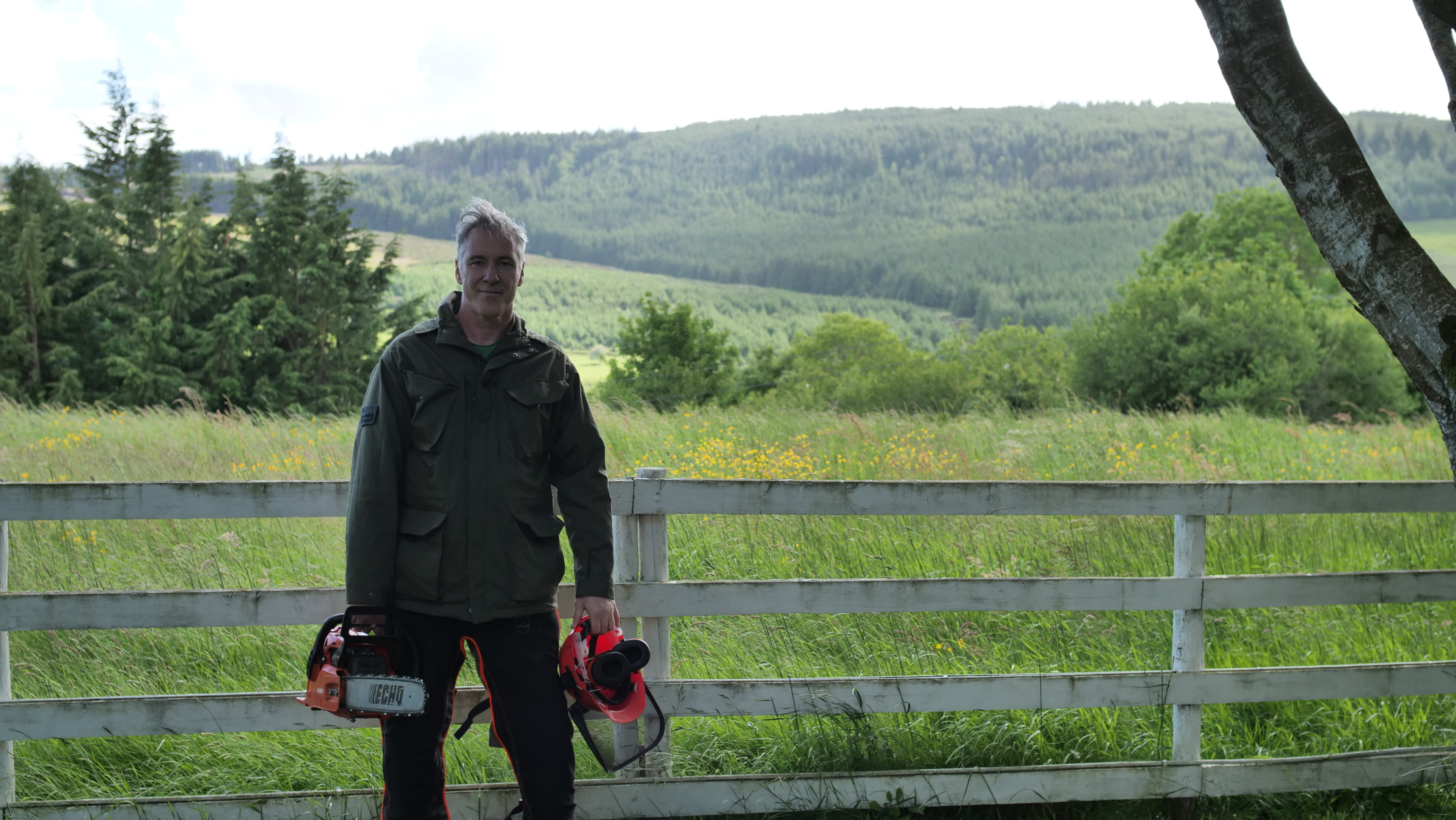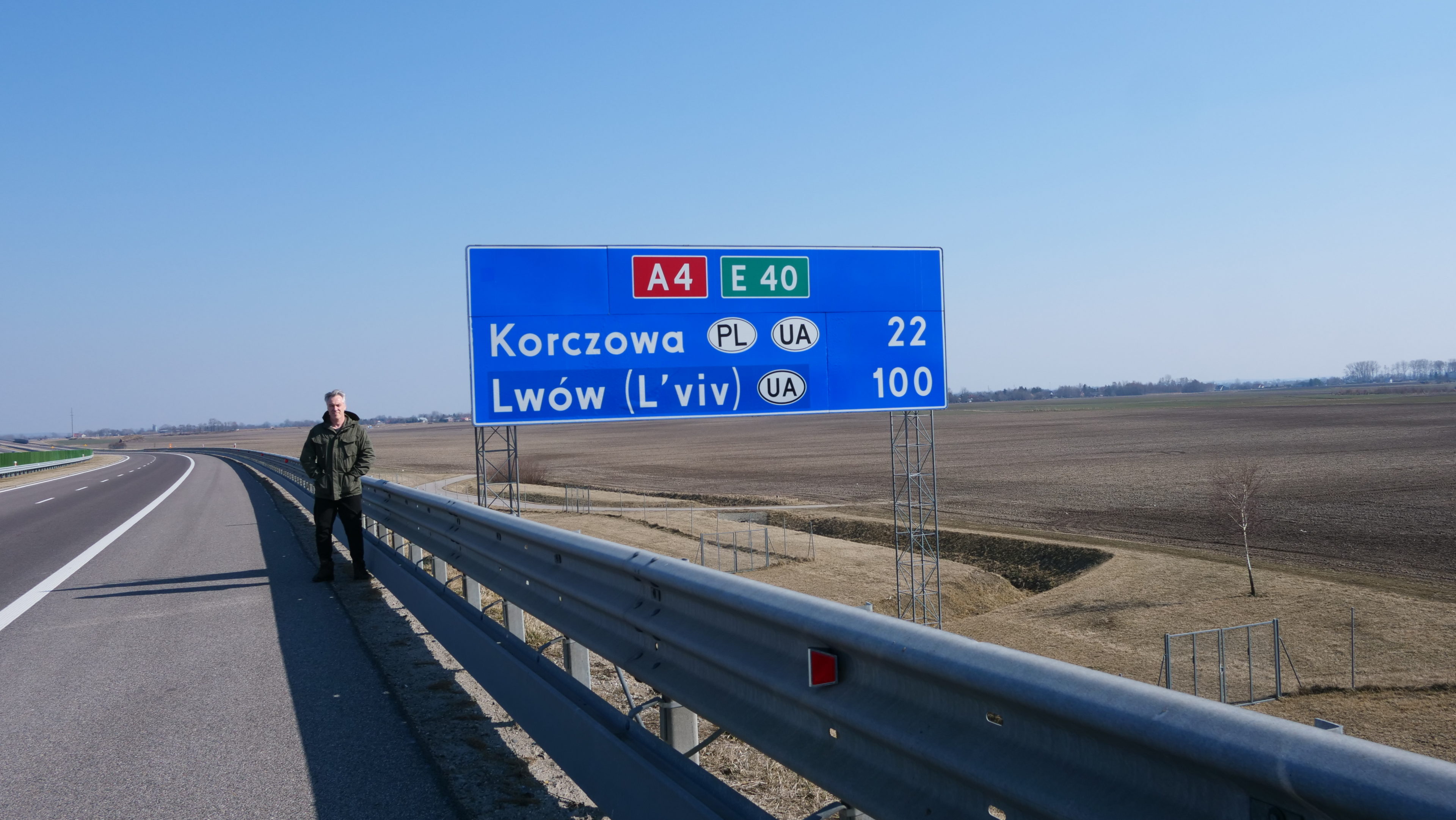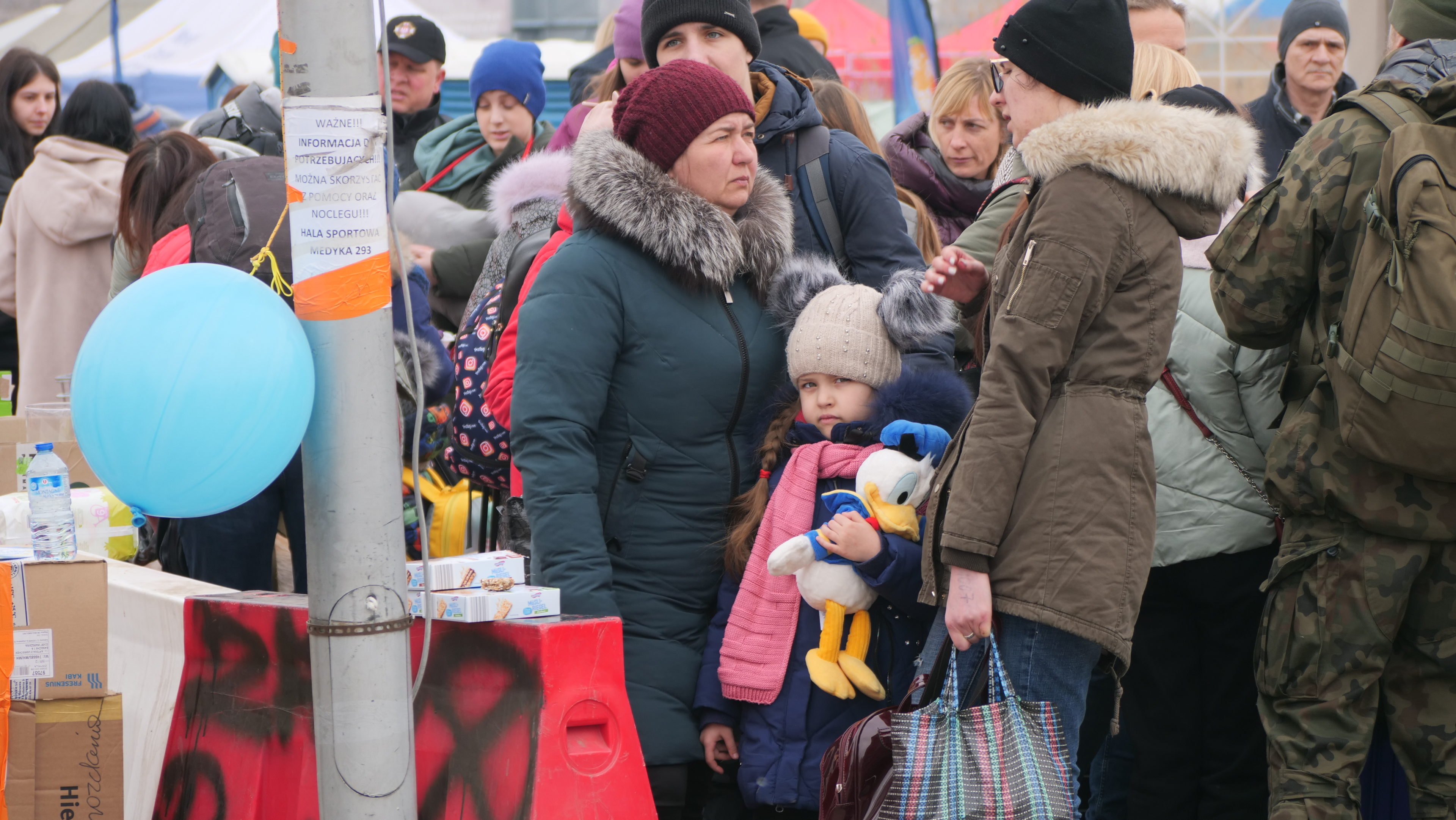When we met Patrick 7 years ago, he had a plan. In fact he always had a plan, for as long as he could remember. He could tell you where he was going, what his goals were and how he would get there. But that was then. As with many of us these days, that certainty has been replaced with a grudging acceptance that perhaps the best plan right now is to wait until more clarity is revealed. For an action-oriented man like Patrick, this has been an entirely new and somewhat disorienting experience.
When career, home and the world at large are all in a state of flux, we try the best we can but we may find ourselves in circumstances where acceptance is the best plan. This doesn’t mean paralysis, though; we all still possess agency. Patrick, for example, is just back from the Poland-Ukraine border where he was helping out with that massive humanitarian crisis.
Are you still running?
Not as much as I used to run. I was running five days a week, going to the gym 3 days a week when Covid hit. Now, I know Covid didn’t stop people from going and running but it did stop people from going to the gym and I developed a running plantar fasciitis. That was a perfect storm; I was out of running for three months and I found it very difficult to get back into it. But I still did 3 kilometers 3 times a week. I said to myself, “The day I can’t do 3 kilometers, I might as well just pack my bags and go.” That’s the basic for me.

What are you doing to stay in shape now?
I’m doing the best exercise I have ever done in my whole life and that’s gardening. I bought a chainsaw but I was afraid to use it for the longest time. So I got a regular saw and started sawing trees. I discovered very quickly that I was building up my muscle and I was losing weight. I’d do that for 3-4 hours at a time. In the beginning, it was really tough. So when I want a workout, I use a saw. I also have protective boots to prevent chainsaw accidents and they’re really heavy so I find that just walking around with these boots, without even knowing it, I’m building up other muscles.
“I’m doing the best exercise I have ever done in my whole life and that’s gardening”
I used to garden when I was a kid. My dad was a gardener and he kind of instilled it in us, whether we wanted it instilled or not. At the time, I wanted to be outside playing with my friends. But as I got older, I actually enjoyed it because I’m out there and I don’t hear any sounds other than the sound of nature.

What was it like moving to Ireland?
It’s been a period of upheaval because we’ve moved out of our house in London, where we lived for 7 years, and that wasn’t something that we wanted to do but our landlord decided to sell the house. My wife Andrea and I haven’t officially moved here yet. We had to be out of where we were living and we tried to find somewhere else to live in London but, because of how things are right now in terms of availability in property, we didn’t find anything that we said we could actually enjoy living in for an extended period of time. We want to be somewhere that we can live for 3-5 years and we weren’t able to find that. And as the date that we had to be out of our old house kept looming, we had to decide what we were going to do. So we came back to Ireland and got set up here but we have some travel plans coming up. So we still feel like we’re in a state of limbo and haven’t really moved somewhere permanent yet. We’re kind of nomads at the moment living out of our suitcases. We don’t know where we’re going to settle down. Ireland was always intended as a holiday home. The other thing we have to take into consideration is whether we want to potentially live in America again.
“We’re kind of nomads at the moment living out of our suitcases”
How does it feel being in a state of flux?
It feels like it’s very representative of the world that we are living in right now. The world is in a state of flux and we are in a state of flux. I remember the night Donald Trump was elected. Nobody believed that he would be elected president. When Andrea came downstairs the next morning, I said, “I have very bad news, Donald Trump was elected president” and she couldn’t believe it. And then the next thing that happened was we had Brexit in the UK.
I think the British government was saved from Brexit because of Covid. Covid came around and no one was talking about Brexit anymore. And then the war in Ukraine came along. We are looking at the next thing and it’s Monkeypox, I guess. There’s just a litany of crises and we are going from one to the next. So this state of limbo kind of leaves you a bit shellshocked. I can’t claim that we know what it feels like to just have one bag, fleeing your country, and never knowing whether you’re able to go back to it. But I do know from my experience about displacement and not feeling welcome in a place and searching for that place to call your forever home.
“My trip to the Poland-Ukraine border was really a gesture to an idea that I had that I wanted to, in some way, meet and help one person.”
Right now we’re learning that living on top of a mountain is beautiful but if anything happened to one or the other of us, the other would have to leave. You wouldn’t want to live here by yourself. We’re finding that we’re caught up in this swirling tide of uncertainty on a daily basis. It leaves you asking a lot of questions and the big question that I have to ask is how to not feel useless. I’m feeling useless at the moment. I’m feeling really like I’m not achieving anything or getting anything done but, having said that, what is life all about in terms of whether you live to work or you have this balance between your work and your social life and your physical wellbeing? Part of me asks: why am I worried? Just enjoy the time that I’m up here. But if you’ve always done certain things in your life, it’s hard to switch that off. I’ve probably worked more in the last 4 years than I did in my younger years. This state of limbo, this shock of waking up one morning and looking at a country being invaded, you think to yourself: “Oh my god. What the hell? What is really important?”
I had a guy give me a script to read and share my thoughts on. And I read it and said “You know, I don’t like it. The story is about a self-indulgent rockstar. Who needs another story about a self-indulgent rockstar when the world is in the state it’s in?” My trip to the Poland-Ukraine border was really a gesture to an idea that I had that I wanted to, in some way, meet and help one person. That would be mission accomplished for me. Instead of sitting on the sofa and watching it unfold everyday, I wanted to actually go there.

I saw these people, women and children, because there’s no men, and they’re floating across and they have no idea where they’re going to be that night. They have a suitcase and a bag and their children with them. You can just see a dazed look on their faces like, Is this really happening? I am a filmmaker but I said I wasn’t going to go and make a film about it, I was going as a human. But I did bring my camera and I did take some photographs and I brought a long lens so I wasn’t in people’s faces taking their photograph.
For the most part, I didn’t take very many photos. But there’s one of people standing on a line waiting for a bus. And there’s a child holding her doll. I’m 50 feet away on the other side of the street. And I don’t know if she was looking at me or if it just looked like she was looking at me. That, for me, is the picture that I show to people when they ask what the border was like. It’s a child holding her doll, just like any other little girl and she suddenly looks very old. Her mother and her aunt or grandmother trying to figure everything out. They’re just in this spot and people are swirling around them. I often wonder why people can’t just be as good to each other without there having to be a war. The way the volunteers were over there, the way the food agencies worked, the way the Polish people helped, it was incredible. Can you imagine 4 million people all of a sudden rushing into your country? That just doesn’t happen. But it did happen. 4-4.5 million people came into Poland and they took them in, into their homes, into their schools.

The overriding sentiment for most Ukrainian people that I met was that they want to go home. They don’t want to be a burden on another country. They want their husbands, they want their lives back. The hardest things that I saw were the men of a certain age, men who were in their 40s and 50s. I spoke to two men in particular outside of the camp, in a shopping mall carpark. I saw this couple in a very old car with Ukraine plates on it and it looked like it had everything they owned in the back. They were just sitting in the front of the car. The place to go for aid was a mile away and the reason why they weren’t going for aid was because, as a man he was supposed to be in Ukraine fighting and as a man he didn’t want to go to one of these places because he’d be sent back. I spoke to this man and I asked if I could help in any way and he said no. I asked if they had petrol in their car and they looked at each other. I said there’s a petrol station down the corner and told them to follow me there so I could fill their car up. They protested and I had to insist. They followed me and I filled their car up and gave them some cash. He started to cry and he said, “I’m the only thing my wife has and I cannot leave her.” They were going to go into Germany. This whole thing about men having to go in to fight, I think that’s an exceptional circumstance.
“The overriding sentiment for most Ukrainian people that I met was that they want to go home. They don’t want to be a burden on another country”
There was another man standing on the side of the road about 3 miles from the border. I drove up and asked if I could help or if he needed a ride and he said, “I’m waiting for my wife and kids to come across.” He was living in Spain and he traveled from there to meet his wife and 2 kids at the border. We’ve stayed in touch. The family made it back to Spain and they’re integrating now into Spanish life. But most Ukrainians, when they work overseas, they do it to earn more money in a place like Spain or England and send it back to build up a sort of savings that they wouldn’t otherwise be able to do. This man felt shame. For me, that’s the real evil of this conflict. Families have been ripped apart, displaced. I met this young girl who was going back over. She had one suitcase. I asked what she was going to do. She said she was not going to leave her father.
One of my goals was just to find people to give money to. $300-$400 could be the difference of surviving there for a month. When I came back from the Ukraine, I told people that I still had to process what I saw because it’s just so unbelievable that in the world we live in today something like this can unfold on our TV screens and that a country like Russia can bomb, kill, and displace so many people while also blaming the Ukrainians.
People would say to me that they aren’t worried about all the relief they’re getting now but that in 6 months’ time maybe the world starts to forget. When I was helping out with the different food agencies, there was so much food, clothing, and shelter available. You just see row after row of cots and people sitting at the end of their cots staring off into the distance and no real conversation.
“If everybody in the world had the thought, ‘Why should I bother to go and help?’ then nothing of value could ever happen”
There’s a cemetery right on the border and it overlooks the camp. A very old man and his wife came to visit their parents’ grave. He could remember WWII because he was a kid then. He couldn’t believe that this is happening now.
This is the first time I’ve actually talked about it since I got back, if I’m honest. I get asked why I went. If everybody in the world had the thought, “Why should I bother to go and help?” then nothing of value could ever happen.
Our situation of being in a state of limbo pales in comparison because, ultimately, we know that we could stay here, go back to London, go to NY. We have first-world options.
I always thought that when you got to a certain age, life would be easy with very few complications and you sit back and have a beer and watch a game. That’s not the case. Right up until you pop your cogs, you’re always looking for the next thing. It seems in life we move from one thing to another. I’ve wrestled with that concept of: Why push? What’s so bad about taking your foot off the gas and coasting for awhile? But it’s not in our DNA.
LEAVE A REPLY
The ideas expressed here are solely the opinions of the author and are not researched or verified by AGEIST LLC, or anyone associated with AGEIST LLC. This material should not be construed as medical advice or recommendation, it is for informational use only. We encourage all readers to discuss with your qualified practitioners the relevance of the application of any of these ideas to your life. The recommendations contained herein are not intended to diagnose, treat, cure or prevent any disease. You should always consult your physician or other qualified health provider before starting any new treatment or stopping any treatment that has been prescribed for you by your physician or other qualified health provider. Please call your doctor or 911 immediately if you think you may have a medical or psychiatric emergency.



These are great interviews! I love what Ageist brings to our minds, our souls, our hearts. Thank you!